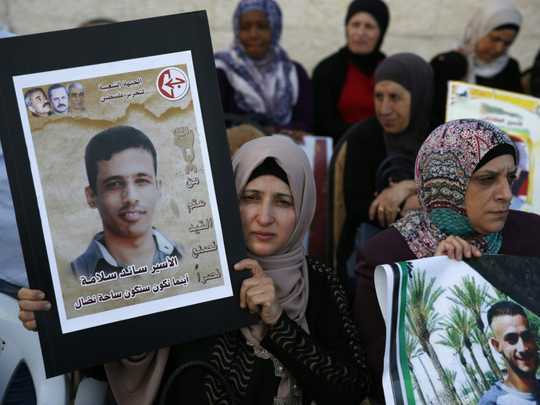
More than 6,500 Palestinians are incarcerated in Israeli prisons. Among them, 57 women and 317 children. More than 800,000 have suffered the same fate since 1948 — at least three times greater than the current population of Bethlehem. Many have been arbitrarily detained without being formally charged or tried. Palestinian children receive mandatory sentences for the ‘crime’ of throwing stones, a law that is not applied to their Israeli peers who have committed far more serious offences.
Israelis bristle when their country is termed an apartheid state. It surely is when Jewish West Bank colonists who burn Palestinian olive groves and attack their owners enjoy virtual immunity from prosecution. A video of an Israeli soldier choking a small boy with an injured arm elicited viewers’ tears on social media. The Israeli soldier who murdered a wounded 21-year-old Palestinian youth last year, while his victim was lying immobilised on the ground, was sentenced to a mere 18 months. Contrast that with the 14-month sentence received by Amal Ahmad Al Sada, a Palestinian woman who attempted to smuggle a phone Sim card to her detained brother.
The world’s spotlight finally shines on the plight of the once-forgotten oppressed imprisoned Palestinians, However, its glow has failed to illuminate the stony hearts of Israeli officials.
A hunger strike initiated by the influential Palestinian politician, Marwan Barghouti, on April 17 inspired 1,500 prisoners to heed his call. Strikers are demanding an end to being treated like worse than caged animals, deprived of family visits and access to lawyers, held for long periods in solitary confinement and subjected to frequent prison transfers. They are also asking for improved medical care.
Barghouti says he has often been shackled and humiliated by strip searches. Others reveal they were forbidden from contacting elderly parents close to death. Family members are routinely barred from entering Israel. Those who qualify are allowed just 45 minutes with their loved one. Since 2001, more than 1,000 have complained they were tortured, but almost all have been dismissed by the lone Shin Bet investigator. No Shin Bet torturer has ever been prosecuted.
It’s been a month since the strike began and it is taking a harsh toll on steadfast participants surviving on water and salt, the prerequisites to life, in particular those with health issues. In some cases, jailors have confiscated the salt that the prisoners had in their possession, but they continue undeterred. Some are planning to refuse even water if their demands go unmet.
Palestinian singer Mohammad Assaf triggered the ‘Salt Water Challenge’ campaign when his downing of a glass was captured on video. Gaza’s hotels and restaurants took everything other than salt and water off their menus. Rallies were held in Lebanon’s Palestinian camps where youths announced their own hunger strike.
Similar expressions of solidarity are gathering pace around the world. British, Irish, Swedish, Spanish and South African supporters of the hunger strikers took to the streets last Sunday. Many more were scheduled to join on Monday to coincide with the 69th anniversary of the Nakba, the “Day of Catastrophe”. Dublin flew the Palestinian flag. South African officials, including one of the two vice-presidents and the country’s Ambassador to Qatar, Professor S.M. Soni, as well as politicians and journalists announced their intention of going without food for 24 hours.
“We only have two types of humans. Those who support a non-racial, non-sexist and democratic society and those that support apartheid and the occupation of Palestinian,” Soni said.
Until now, Israeli officials are unmoved and despite warnings from the Palestinian National Authority that their failure to negotiate with prisoner leaders could spark a major uprising, compromise is absent from the Israeli government’s agenda. Instead, Israel attempted to smear Barghouti’s credibility by publishing photographs of a Photoshopped candy bar in what was falsely claimed to be his cell. Pizza Hut’s Israeli franchise capitalised on that propagandist trick with a crass advert. The company superimposed a pizza box on the photograph with the caption “Barghouti, if you’re going to break the strike, why not a pizza?” This resulted in calls for a boycott, forcing Pizza Hut to cancel the ad and issue an apology.
The Hebrew University also showed its disdain for the prisoners’ plight. It cancelled a long planned conference on that very topic organised by The Harry S. Truman Research Institute, in response to criticism from a students’ group aligned to the right-wing Jewish Home Party.
The concern is that rather than being embarrassed by prisoners starving to death, prisons may resort to force-feeding the inmates. Force-feeding has been identified by the Red Cross and the American Medical Association as a form of torture. Yet, Israel considers it to be a legal option.
All the strikers want is to be treated as human beings with rights. All Israel has to do to end this standoff is to comply with accepted international norms. But for a state that eschews human rights and thrives on condemnation, showing a little compassion might be a hill too far to climb.
Linda S. Heard is an award-winning British political columnist and guest television commentator with a focus on the Middle East.








